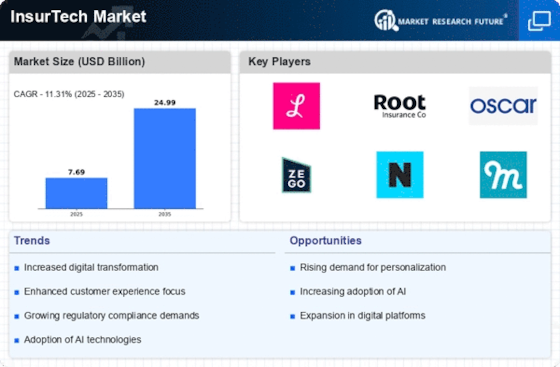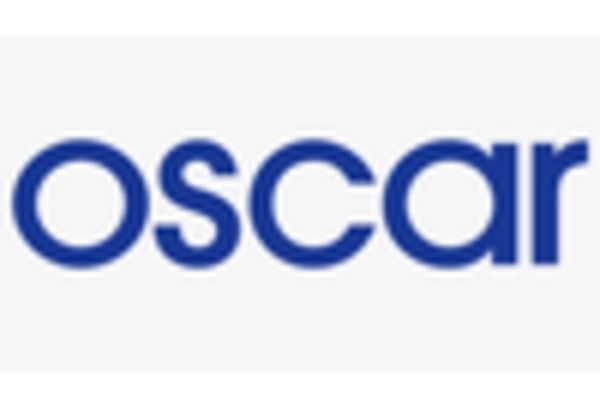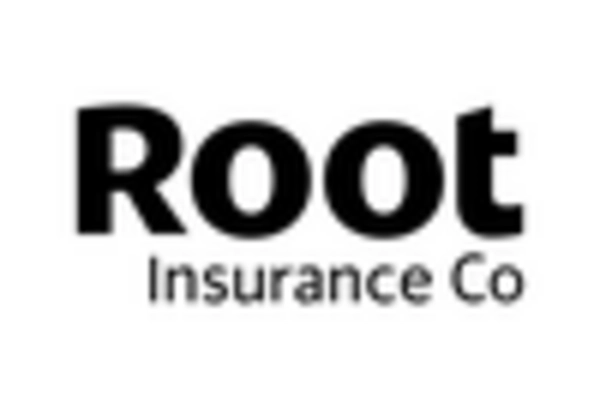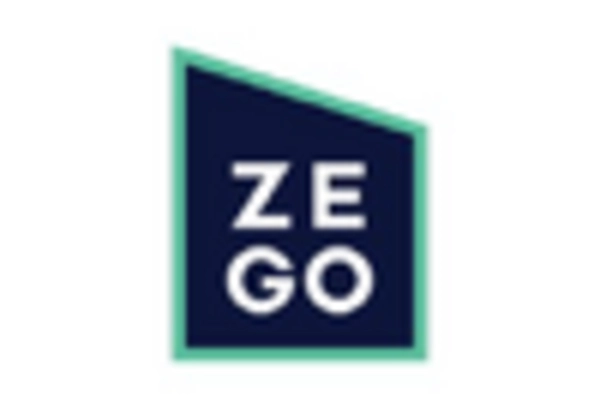-
EXECUTIVE SUMMARY
-
Market Overview
-
Key Findings
-
Market Segmentation
-
Competitive Landscape
-
Challenges and Opportunities
-
Future Outlook
-
MARKET INTRODUCTION
-
Definition
-
Scope of the study
- Research Objective
- Assumption
- Limitations
-
RESEARCH METHODOLOGY
-
Overview
-
Data Mining
-
Secondary Research
-
Primary Research
- Primary Interviews and Information Gathering Process
- Breakdown of Primary Respondents
-
Forecasting Model
-
Market Size Estimation
- Bottom-Up Approach
- Top-Down Approach
-
Data Triangulation
-
Validation
-
MARKET DYNAMICS
-
Overview
-
Drivers
-
Restraints
-
Opportunities
-
MARKET FACTOR ANALYSIS
-
Value chain Analysis
-
Porter''s Five Forces Analysis
- Bargaining Power of Suppliers
- Bargaining Power of Buyers
- Threat of New Entrants
- Threat of Substitutes
- Intensity of Rivalry
-
COVID-19 Impact Analysis
- Market Impact Analysis
- Regional Impact
- Opportunity and Threat Analysis
-
INSURTECH MARKET, BY TECHNOLOGY (USD BILLION)
-
Artificial Intelligence
-
Blockchain
-
Internet of Things
-
Big Data Analytics
-
Cloud Computing
-
INSURTECH MARKET, BY INSURANCE TYPE (USD BILLION)
-
Health Insurance
-
Life Insurance
-
Property Insurance
-
Automobile Insurance
-
INSURTECH MARKET, BY DISTRIBUTION CHANNEL (USD BILLION)
-
Direct Sales
-
Brokerage
-
Online Platforms
-
Telemarketing
-
INSURTECH MARKET, BY CUSTOMER TYPE (USD BILLION)
-
Individual Customers
-
Small and Medium Enterprises
-
Corporates
-
INSURTECH MARKET, BY REGIONAL (USD BILLION)
-
North America
- US
- Canada
-
Europe
- Germany
- UK
- France
- Russia
- Italy
- Spain
- Rest of Europe
-
APAC
- China
- India
- Japan
- South Korea
- Malaysia
- Thailand
- Indonesia
- Rest of APAC
-
South America
- Brazil
- Mexico
- Argentina
- Rest of South America
-
MEA
- GCC Countries
- South Africa
- Rest of MEA
-
COMPETITIVE LANDSCAPE
-
Overview
-
Competitive Analysis
-
Market share Analysis
-
Major Growth Strategy in the InsurTech Market
-
Competitive Benchmarking
-
Leading Players in Terms of Number of Developments in the InsurTech Market
-
Key developments and growth strategies
- New Product Launch/Service Deployment
- Merger & Acquisitions
- Joint Ventures
-
Major Players Financial Matrix
- Sales and Operating Income
- Major Players R&D Expenditure. 2023
-
COMPANY PROFILES
-
Clover Health
- Financial Overview
- Products Offered
- Key Developments
- SWOT Analysis
- Key Strategies
-
Zego
- Financial Overview
- Products Offered
- Key Developments
- SWOT Analysis
- Key Strategies
-
Oscar Health
- Financial Overview
- Products Offered
- Key Developments
- SWOT Analysis
- Key Strategies
-
Next Insurance
- Financial Overview
- Products Offered
- Key Developments
- SWOT Analysis
- Key Strategies
-
Slice Labs
- Financial Overview
- Products Offered
- Key Developments
- SWOT Analysis
- Key Strategies
-
Cazoo
- Financial Overview
- Products Offered
- Key Developments
- SWOT Analysis
- Key Strategies
-
Metromile
- Financial Overview
- Products Offered
- Key Developments
- SWOT Analysis
- Key Strategies
-
Root Insurance
- Financial Overview
- Products Offered
- Key Developments
- SWOT Analysis
- Key Strategies
-
Hippo Insurance
- Financial Overview
- Products Offered
- Key Developments
- SWOT Analysis
- Key Strategies
-
Bright Health
- Financial Overview
- Products Offered
- Key Developments
- SWOT Analysis
- Key Strategies
-
CoverWallet
- Financial Overview
- Products Offered
- Key Developments
- SWOT Analysis
- Key Strategies
-
Pie Insurance
- Financial Overview
- Products Offered
- Key Developments
- SWOT Analysis
- Key Strategies
-
Lemonade
- Financial Overview
- Products Offered
- Key Developments
- SWOT Analysis
- Key Strategies
-
Sure
- Financial Overview
- Products Offered
- Key Developments
- SWOT Analysis
- Key Strategies
-
APPENDIX
-
References
-
Related Reports
-
LIST OF TABLES
-
LIST OF ASSUMPTIONS
-
NORTH AMERICA INSURTECH MARKET SIZE ESTIMATES & FORECAST, BY TECHNOLOGY, 2019-2035 (USD BILLIONS)
-
NORTH AMERICA INSURTECH MARKET SIZE ESTIMATES & FORECAST, BY INSURANCE TYPE, 2019-2035 (USD BILLIONS)
-
NORTH AMERICA INSURTECH MARKET SIZE ESTIMATES & FORECAST, BY DISTRIBUTION CHANNEL, 2019-2035 (USD BILLIONS)
-
NORTH AMERICA INSURTECH MARKET SIZE ESTIMATES & FORECAST, BY CUSTOMER TYPE, 2019-2035 (USD BILLIONS)
-
NORTH AMERICA INSURTECH MARKET SIZE ESTIMATES & FORECAST, BY REGIONAL, 2019-2035 (USD BILLIONS)
-
US INSURTECH MARKET SIZE ESTIMATES & FORECAST, BY TECHNOLOGY, 2019-2035 (USD BILLIONS)
-
US INSURTECH MARKET SIZE ESTIMATES & FORECAST, BY INSURANCE TYPE, 2019-2035 (USD BILLIONS)
-
US INSURTECH MARKET SIZE ESTIMATES & FORECAST, BY DISTRIBUTION CHANNEL, 2019-2035 (USD BILLIONS)
-
US INSURTECH MARKET SIZE ESTIMATES & FORECAST, BY CUSTOMER TYPE, 2019-2035 (USD BILLIONS)
-
US INSURTECH MARKET SIZE ESTIMATES & FORECAST, BY REGIONAL, 2019-2035 (USD BILLIONS)
-
CANADA INSURTECH MARKET SIZE ESTIMATES & FORECAST, BY TECHNOLOGY, 2019-2035 (USD BILLIONS)
-
CANADA INSURTECH MARKET SIZE ESTIMATES & FORECAST, BY INSURANCE TYPE, 2019-2035 (USD BILLIONS)
-
CANADA INSURTECH MARKET SIZE ESTIMATES & FORECAST, BY DISTRIBUTION CHANNEL, 2019-2035 (USD BILLIONS)
-
CANADA INSURTECH MARKET SIZE ESTIMATES & FORECAST, BY CUSTOMER TYPE, 2019-2035 (USD BILLIONS)
-
CANADA INSURTECH MARKET SIZE ESTIMATES & FORECAST, BY REGIONAL, 2019-2035 (USD BILLIONS)
-
EUROPE INSURTECH MARKET SIZE ESTIMATES & FORECAST, BY TECHNOLOGY, 2019-2035 (USD BILLIONS)
-
EUROPE INSURTECH MARKET SIZE ESTIMATES & FORECAST, BY INSURANCE TYPE, 2019-2035 (USD BILLIONS)
-
EUROPE INSURTECH MARKET SIZE ESTIMATES & FORECAST, BY DISTRIBUTION CHANNEL, 2019-2035 (USD BILLIONS)
-
EUROPE INSURTECH MARKET SIZE ESTIMATES & FORECAST, BY CUSTOMER TYPE, 2019-2035 (USD BILLIONS)
-
EUROPE INSURTECH MARKET SIZE ESTIMATES & FORECAST, BY REGIONAL, 2019-2035 (USD BILLIONS)
-
GERMANY INSURTECH MARKET SIZE ESTIMATES & FORECAST, BY TECHNOLOGY, 2019-2035 (USD BILLIONS)
-
GERMANY INSURTECH MARKET SIZE ESTIMATES & FORECAST, BY INSURANCE TYPE, 2019-2035 (USD BILLIONS)
-
GERMANY INSURTECH MARKET SIZE ESTIMATES & FORECAST, BY DISTRIBUTION CHANNEL, 2019-2035 (USD BILLIONS)
-
GERMANY INSURTECH MARKET SIZE ESTIMATES & FORECAST, BY CUSTOMER TYPE, 2019-2035 (USD BILLIONS)
-
GERMANY INSURTECH MARKET SIZE ESTIMATES & FORECAST, BY REGIONAL, 2019-2035 (USD BILLIONS)
-
UK INSURTECH MARKET SIZE ESTIMATES & FORECAST, BY TECHNOLOGY, 2019-2035 (USD BILLIONS)
-
UK INSURTECH MARKET SIZE ESTIMATES & FORECAST, BY INSURANCE TYPE, 2019-2035 (USD BILLIONS)
-
UK INSURTECH MARKET SIZE ESTIMATES & FORECAST, BY DISTRIBUTION CHANNEL, 2019-2035 (USD BILLIONS)
-
UK INSURTECH MARKET SIZE ESTIMATES & FORECAST, BY CUSTOMER TYPE, 2019-2035 (USD BILLIONS)
-
UK INSURTECH MARKET SIZE ESTIMATES & FORECAST, BY REGIONAL, 2019-2035 (USD BILLIONS)
-
FRANCE INSURTECH MARKET SIZE ESTIMATES & FORECAST, BY TECHNOLOGY, 2019-2035 (USD BILLIONS)
-
FRANCE INSURTECH MARKET SIZE ESTIMATES & FORECAST, BY INSURANCE TYPE, 2019-2035 (USD BILLIONS)
-
FRANCE INSURTECH MARKET SIZE ESTIMATES & FORECAST, BY DISTRIBUTION CHANNEL, 2019-2035 (USD BILLIONS)
-
FRANCE INSURTECH MARKET SIZE ESTIMATES & FORECAST, BY CUSTOMER TYPE, 2019-2035 (USD BILLIONS)
-
FRANCE INSURTECH MARKET SIZE ESTIMATES & FORECAST, BY REGIONAL, 2019-2035 (USD BILLIONS)
-
RUSSIA INSURTECH MARKET SIZE ESTIMATES & FORECAST, BY TECHNOLOGY, 2019-2035 (USD BILLIONS)
-
RUSSIA INSURTECH MARKET SIZE ESTIMATES & FORECAST, BY INSURANCE TYPE, 2019-2035 (USD BILLIONS)
-
RUSSIA INSURTECH MARKET SIZE ESTIMATES & FORECAST, BY DISTRIBUTION CHANNEL, 2019-2035 (USD BILLIONS)
-
RUSSIA INSURTECH MARKET SIZE ESTIMATES & FORECAST, BY CUSTOMER TYPE, 2019-2035 (USD BILLIONS)
-
RUSSIA INSURTECH MARKET SIZE ESTIMATES & FORECAST, BY REGIONAL, 2019-2035 (USD BILLIONS)
-
ITALY INSURTECH MARKET SIZE ESTIMATES & FORECAST, BY TECHNOLOGY, 2019-2035 (USD BILLIONS)
-
ITALY INSURTECH MARKET SIZE ESTIMATES & FORECAST, BY INSURANCE TYPE, 2019-2035 (USD BILLIONS)
-
ITALY INSURTECH MARKET SIZE ESTIMATES & FORECAST, BY DISTRIBUTION CHANNEL, 2019-2035 (USD BILLIONS)
-
ITALY INSURTECH MARKET SIZE ESTIMATES & FORECAST, BY CUSTOMER TYPE, 2019-2035 (USD BILLIONS)
-
ITALY INSURTECH MARKET SIZE ESTIMATES & FORECAST, BY REGIONAL, 2019-2035 (USD BILLIONS)
-
SPAIN INSURTECH MARKET SIZE ESTIMATES & FORECAST, BY TECHNOLOGY, 2019-2035 (USD BILLIONS)
-
SPAIN INSURTECH MARKET SIZE ESTIMATES & FORECAST, BY INSURANCE TYPE, 2019-2035 (USD BILLIONS)
-
SPAIN INSURTECH MARKET SIZE ESTIMATES & FORECAST, BY DISTRIBUTION CHANNEL, 2019-2035 (USD BILLIONS)
-
SPAIN INSURTECH MARKET SIZE ESTIMATES & FORECAST, BY CUSTOMER TYPE, 2019-2035 (USD BILLIONS)
-
SPAIN INSURTECH MARKET SIZE ESTIMATES & FORECAST, BY REGIONAL, 2019-2035 (USD BILLIONS)
-
REST OF EUROPE INSURTECH MARKET SIZE ESTIMATES & FORECAST, BY TECHNOLOGY, 2019-2035 (USD BILLIONS)
-
REST OF EUROPE INSURTECH MARKET SIZE ESTIMATES & FORECAST, BY INSURANCE TYPE, 2019-2035 (USD BILLIONS)
-
REST OF EUROPE INSURTECH MARKET SIZE ESTIMATES & FORECAST, BY DISTRIBUTION CHANNEL, 2019-2035 (USD BILLIONS)
-
REST OF EUROPE INSURTECH MARKET SIZE ESTIMATES & FORECAST, BY CUSTOMER TYPE, 2019-2035 (USD BILLIONS)
-
REST OF EUROPE INSURTECH MARKET SIZE ESTIMATES & FORECAST, BY REGIONAL, 2019-2035 (USD BILLIONS)
-
APAC INSURTECH MARKET SIZE ESTIMATES & FORECAST, BY TECHNOLOGY, 2019-2035 (USD BILLIONS)
-
APAC INSURTECH MARKET SIZE ESTIMATES & FORECAST, BY INSURANCE TYPE, 2019-2035 (USD BILLIONS)
-
APAC INSURTECH MARKET SIZE ESTIMATES & FORECAST, BY DISTRIBUTION CHANNEL, 2019-2035 (USD BILLIONS)
-
APAC INSURTECH MARKET SIZE ESTIMATES & FORECAST, BY CUSTOMER TYPE, 2019-2035 (USD BILLIONS)
-
APAC INSURTECH MARKET SIZE ESTIMATES & FORECAST, BY REGIONAL, 2019-2035 (USD BILLIONS)
-
CHINA INSURTECH MARKET SIZE ESTIMATES & FORECAST, BY TECHNOLOGY, 2019-2035 (USD BILLIONS)
-
CHINA INSURTECH MARKET SIZE ESTIMATES & FORECAST, BY INSURANCE TYPE, 2019-2035 (USD BILLIONS)
-
CHINA INSURTECH MARKET SIZE ESTIMATES & FORECAST, BY DISTRIBUTION CHANNEL, 2019-2035 (USD BILLIONS)
-
CHINA INSURTECH MARKET SIZE ESTIMATES & FORECAST, BY CUSTOMER TYPE, 2019-2035 (USD BILLIONS)
-
CHINA INSURTECH MARKET SIZE ESTIMATES & FORECAST, BY REGIONAL, 2019-2035 (USD BILLIONS)
-
INDIA INSURTECH MARKET SIZE ESTIMATES & FORECAST, BY TECHNOLOGY, 2019-2035 (USD BILLIONS)
-
INDIA INSURTECH MARKET SIZE ESTIMATES & FORECAST, BY INSURANCE TYPE, 2019-2035 (USD BILLIONS)
-
INDIA INSURTECH MARKET SIZE ESTIMATES & FORECAST, BY DISTRIBUTION CHANNEL, 2019-2035 (USD BILLIONS)
-
INDIA INSURTECH MARKET SIZE ESTIMATES & FORECAST, BY CUSTOMER TYPE, 2019-2035 (USD BILLIONS)
-
INDIA INSURTECH MARKET SIZE ESTIMATES & FORECAST, BY REGIONAL, 2019-2035 (USD BILLIONS)
-
JAPAN INSURTECH MARKET SIZE ESTIMATES & FORECAST, BY TECHNOLOGY, 2019-2035 (USD BILLIONS)
-
JAPAN INSURTECH MARKET SIZE ESTIMATES & FORECAST, BY INSURANCE TYPE, 2019-2035 (USD BILLIONS)
-
JAPAN INSURTECH MARKET SIZE ESTIMATES & FORECAST, BY DISTRIBUTION CHANNEL, 2019-2035 (USD BILLIONS)
-
JAPAN INSURTECH MARKET SIZE ESTIMATES & FORECAST, BY CUSTOMER TYPE, 2019-2035 (USD BILLIONS)
-
JAPAN INSURTECH MARKET SIZE ESTIMATES & FORECAST, BY REGIONAL, 2019-2035 (USD BILLIONS)
-
SOUTH KOREA INSURTECH MARKET SIZE ESTIMATES & FORECAST, BY TECHNOLOGY, 2019-2035 (USD BILLIONS)
-
SOUTH KOREA INSURTECH MARKET SIZE ESTIMATES & FORECAST, BY INSURANCE TYPE, 2019-2035 (USD BILLIONS)
-
SOUTH KOREA INSURTECH MARKET SIZE ESTIMATES & FORECAST, BY DISTRIBUTION CHANNEL, 2019-2035 (USD BILLIONS)
-
SOUTH KOREA INSURTECH MARKET SIZE ESTIMATES & FORECAST, BY CUSTOMER TYPE, 2019-2035 (USD BILLIONS)
-
SOUTH KOREA INSURTECH MARKET SIZE ESTIMATES & FORECAST, BY REGIONAL, 2019-2035 (USD BILLIONS)
-
MALAYSIA INSURTECH MARKET SIZE ESTIMATES & FORECAST, BY TECHNOLOGY, 2019-2035 (USD BILLIONS)
-
MALAYSIA INSURTECH MARKET SIZE ESTIMATES & FORECAST, BY INSURANCE TYPE, 2019-2035 (USD BILLIONS)
-
MALAYSIA INSURTECH MARKET SIZE ESTIMATES & FORECAST, BY DISTRIBUTION CHANNEL, 2019-2035 (USD BILLIONS)
-
MALAYSIA INSURTECH MARKET SIZE ESTIMATES & FORECAST, BY CUSTOMER TYPE, 2019-2035 (USD BILLIONS)
-
MALAYSIA INSURTECH MARKET SIZE ESTIMATES & FORECAST, BY REGIONAL, 2019-2035 (USD BILLIONS)
-
THAILAND INSURTECH MARKET SIZE ESTIMATES & FORECAST, BY TECHNOLOGY, 2019-2035 (USD BILLIONS)
-
THAILAND INSURTECH MARKET SIZE ESTIMATES & FORECAST, BY INSURANCE TYPE, 2019-2035 (USD BILLIONS)
-
THAILAND INSURTECH MARKET SIZE ESTIMATES & FORECAST, BY DISTRIBUTION CHANNEL, 2019-2035 (USD BILLIONS)
-
THAILAND INSURTECH MARKET SIZE ESTIMATES & FORECAST, BY CUSTOMER TYPE, 2019-2035 (USD BILLIONS)
-
THAILAND INSURTECH MARKET SIZE ESTIMATES & FORECAST, BY REGIONAL, 2019-2035 (USD BILLIONS)
-
INDONESIA INSURTECH MARKET SIZE ESTIMATES & FORECAST, BY TECHNOLOGY, 2019-2035 (USD BILLIONS)
-
INDONESIA INSURTECH MARKET SIZE ESTIMATES & FORECAST, BY INSURANCE TYPE, 2019-2035 (USD BILLIONS)
-
INDONESIA INSURTECH MARKET SIZE ESTIMATES & FORECAST, BY DISTRIBUTION CHANNEL, 2019-2035 (USD BILLIONS)
-
INDONESIA INSURTECH MARKET SIZE ESTIMATES & FORECAST, BY CUSTOMER TYPE, 2019-2035 (USD BILLIONS)
-
INDONESIA INSURTECH MARKET SIZE ESTIMATES & FORECAST, BY REGIONAL, 2019-2035 (USD BILLIONS)
-
REST OF APAC INSURTECH MARKET SIZE ESTIMATES & FORECAST, BY TECHNOLOGY, 2019-2035 (USD BILLIONS)
-
REST OF APAC INSURTECH MARKET SIZE ESTIMATES & FORECAST, BY INSURANCE TYPE, 2019-2035 (USD BILLIONS)
-
REST OF APAC INSURTECH MARKET SIZE ESTIMATES & FORECAST, BY DISTRIBUTION CHANNEL, 2019-2035 (USD BILLIONS)
-
REST OF APAC INSURTECH MARKET SIZE ESTIMATES & FORECAST, BY CUSTOMER TYPE, 2019-2035 (USD BILLIONS)
-
REST OF APAC INSURTECH MARKET SIZE ESTIMATES & FORECAST, BY REGIONAL, 2019-2035 (USD BILLIONS)
-
SOUTH AMERICA INSURTECH MARKET SIZE ESTIMATES & FORECAST, BY TECHNOLOGY, 2019-2035 (USD BILLIONS)
-
SOUTH AMERICA INSURTECH MARKET SIZE ESTIMATES & FORECAST, BY INSURANCE TYPE, 2019-2035 (USD BILLIONS)
-
SOUTH AMERICA INSURTECH MARKET SIZE ESTIMATES & FORECAST, BY DISTRIBUTION CHANNEL, 2019-2035 (USD BILLIONS)
-
SOUTH AMERICA INSURTECH MARKET SIZE ESTIMATES & FORECAST, BY CUSTOMER TYPE, 2019-2035 (USD BILLIONS)
-
SOUTH AMERICA INSURTECH MARKET SIZE ESTIMATES & FORECAST, BY REGIONAL, 2019-2035 (USD BILLIONS)
-
BRAZIL INSURTECH MARKET SIZE ESTIMATES & FORECAST, BY TECHNOLOGY, 2019-2035 (USD BILLIONS)
-
BRAZIL INSURTECH MARKET SIZE ESTIMATES & FORECAST, BY INSURANCE TYPE, 2019-2035 (USD BILLIONS)
-
BRAZIL INSURTECH MARKET SIZE ESTIMATES & FORECAST, BY DISTRIBUTION CHANNEL, 2019-2035 (USD BILLIONS)
-
BRAZIL INSURTECH MARKET SIZE ESTIMATES & FORECAST, BY CUSTOMER TYPE, 2019-2035 (USD BILLIONS)
-
BRAZIL INSURTECH MARKET SIZE ESTIMATES & FORECAST, BY REGIONAL, 2019-2035 (USD BILLIONS)
-
MEXICO INSURTECH MARKET SIZE ESTIMATES & FORECAST, BY TECHNOLOGY, 2019-2035 (USD BILLIONS)
-
MEXICO INSURTECH MARKET SIZE ESTIMATES & FORECAST, BY INSURANCE TYPE, 2019-2035 (USD BILLIONS)
-
MEXICO INSURTECH MARKET SIZE ESTIMATES & FORECAST, BY DISTRIBUTION CHANNEL, 2019-2035 (USD BILLIONS)
-
MEXICO INSURTECH MARKET SIZE ESTIMATES & FORECAST, BY CUSTOMER TYPE, 2019-2035 (USD BILLIONS)
-
MEXICO INSURTECH MARKET SIZE ESTIMATES & FORECAST, BY REGIONAL, 2019-2035 (USD BILLIONS)
-
ARGENTINA INSURTECH MARKET SIZE ESTIMATES & FORECAST, BY TECHNOLOGY, 2019-2035 (USD BILLIONS)
-
ARGENTINA INSURTECH MARKET SIZE ESTIMATES & FORECAST, BY INSURANCE TYPE, 2019-2035 (USD BILLIONS)
-
ARGENTINA INSURTECH MARKET SIZE ESTIMATES & FORECAST, BY DISTRIBUTION CHANNEL, 2019-2035 (USD BILLIONS)
-
ARGENTINA INSURTECH MARKET SIZE ESTIMATES & FORECAST, BY CUSTOMER TYPE, 2019-2035 (USD BILLIONS)
-
ARGENTINA INSURTECH MARKET SIZE ESTIMATES & FORECAST, BY REGIONAL, 2019-2035 (USD BILLIONS)
-
REST OF SOUTH AMERICA INSURTECH MARKET SIZE ESTIMATES & FORECAST, BY TECHNOLOGY, 2019-2035 (USD BILLIONS)
-
REST OF SOUTH AMERICA INSURTECH MARKET SIZE ESTIMATES & FORECAST, BY INSURANCE TYPE, 2019-2035 (USD BILLIONS)
-
REST OF SOUTH AMERICA INSURTECH MARKET SIZE ESTIMATES & FORECAST, BY DISTRIBUTION CHANNEL, 2019-2035 (USD BILLIONS)
-
REST OF SOUTH AMERICA INSURTECH MARKET SIZE ESTIMATES & FORECAST, BY CUSTOMER TYPE, 2019-2035 (USD BILLIONS)
-
REST OF SOUTH AMERICA INSURTECH MARKET SIZE ESTIMATES & FORECAST, BY REGIONAL, 2019-2035 (USD BILLIONS)
-
MEA INSURTECH MARKET SIZE ESTIMATES & FORECAST, BY TECHNOLOGY, 2019-2035 (USD BILLIONS)
-
MEA INSURTECH MARKET SIZE ESTIMATES & FORECAST, BY INSURANCE TYPE, 2019-2035 (USD BILLIONS)
-
MEA INSURTECH MARKET SIZE ESTIMATES & FORECAST, BY DISTRIBUTION CHANNEL, 2019-2035 (USD BILLIONS)
-
MEA INSURTECH MARKET SIZE ESTIMATES & FORECAST, BY CUSTOMER TYPE, 2019-2035 (USD BILLIONS)
-
MEA INSURTECH MARKET SIZE ESTIMATES & FORECAST, BY REGIONAL, 2019-2035 (USD BILLIONS)
-
GCC COUNTRIES INSURTECH MARKET SIZE ESTIMATES & FORECAST, BY TECHNOLOGY, 2019-2035 (USD BILLIONS)
-
GCC COUNTRIES INSURTECH MARKET SIZE ESTIMATES & FORECAST, BY INSURANCE TYPE, 2019-2035 (USD BILLIONS)
-
GCC COUNTRIES INSURTECH MARKET SIZE ESTIMATES & FORECAST, BY DISTRIBUTION CHANNEL, 2019-2035 (USD BILLIONS)
-
GCC COUNTRIES INSURTECH MARKET SIZE ESTIMATES & FORECAST, BY CUSTOMER TYPE, 2019-2035 (USD BILLIONS)
-
GCC COUNTRIES INSURTECH MARKET SIZE ESTIMATES & FORECAST, BY REGIONAL, 2019-2035 (USD BILLIONS)
-
SOUTH AFRICA INSURTECH MARKET SIZE ESTIMATES & FORECAST, BY TECHNOLOGY, 2019-2035 (USD BILLIONS)
-
SOUTH AFRICA INSURTECH MARKET SIZE ESTIMATES & FORECAST, BY INSURANCE TYPE, 2019-2035 (USD BILLIONS)
-
SOUTH AFRICA INSURTECH MARKET SIZE ESTIMATES & FORECAST, BY DISTRIBUTION CHANNEL, 2019-2035 (USD BILLIONS)
-
SOUTH AFRICA INSURTECH MARKET SIZE ESTIMATES & FORECAST, BY CUSTOMER TYPE, 2019-2035 (USD BILLIONS)
-
SOUTH AFRICA INSURTECH MARKET SIZE ESTIMATES & FORECAST, BY REGIONAL, 2019-2035 (USD BILLIONS)
-
REST OF MEA INSURTECH MARKET SIZE ESTIMATES & FORECAST, BY TECHNOLOGY, 2019-2035 (USD BILLIONS)
-
REST OF MEA INSURTECH MARKET SIZE ESTIMATES & FORECAST, BY INSURANCE TYPE, 2019-2035 (USD BILLIONS)
-
REST OF MEA INSURTECH MARKET SIZE ESTIMATES & FORECAST, BY DISTRIBUTION CHANNEL, 2019-2035 (USD BILLIONS)
-
REST OF MEA INSURTECH MARKET SIZE ESTIMATES & FORECAST, BY CUSTOMER TYPE, 2019-2035 (USD BILLIONS)
-
REST OF MEA INSURTECH MARKET SIZE ESTIMATES & FORECAST, BY REGIONAL, 2019-2035 (USD BILLIONS)
-
PRODUCT LAUNCH/PRODUCT DEVELOPMENT/APPROVAL
-
ACQUISITION/PARTNERSHIP
-
LIST OF FIGURES
-
MARKET SYNOPSIS
-
NORTH AMERICA INSURTECH MARKET ANALYSIS
-
US INSURTECH MARKET ANALYSIS BY TECHNOLOGY
-
US INSURTECH MARKET ANALYSIS BY INSURANCE TYPE
-
US INSURTECH MARKET ANALYSIS BY DISTRIBUTION CHANNEL
-
US INSURTECH MARKET ANALYSIS BY CUSTOMER TYPE
-
US INSURTECH MARKET ANALYSIS BY REGIONAL
-
CANADA INSURTECH MARKET ANALYSIS BY TECHNOLOGY
-
CANADA INSURTECH MARKET ANALYSIS BY INSURANCE TYPE
-
CANADA INSURTECH MARKET ANALYSIS BY DISTRIBUTION CHANNEL
-
CANADA INSURTECH MARKET ANALYSIS BY CUSTOMER TYPE
-
CANADA INSURTECH MARKET ANALYSIS BY REGIONAL
-
EUROPE INSURTECH MARKET ANALYSIS
-
GERMANY INSURTECH MARKET ANALYSIS BY TECHNOLOGY
-
GERMANY INSURTECH MARKET ANALYSIS BY INSURANCE TYPE
-
GERMANY INSURTECH MARKET ANALYSIS BY DISTRIBUTION CHANNEL
-
GERMANY INSURTECH MARKET ANALYSIS BY CUSTOMER TYPE
-
GERMANY INSURTECH MARKET ANALYSIS BY REGIONAL
-
UK INSURTECH MARKET ANALYSIS BY TECHNOLOGY
-
UK INSURTECH MARKET ANALYSIS BY INSURANCE TYPE
-
UK INSURTECH MARKET ANALYSIS BY DISTRIBUTION CHANNEL
-
UK INSURTECH MARKET ANALYSIS BY CUSTOMER TYPE
-
UK INSURTECH MARKET ANALYSIS BY REGIONAL
-
FRANCE INSURTECH MARKET ANALYSIS BY TECHNOLOGY
-
FRANCE INSURTECH MARKET ANALYSIS BY INSURANCE TYPE
-
FRANCE INSURTECH MARKET ANALYSIS BY DISTRIBUTION CHANNEL
-
FRANCE INSURTECH MARKET ANALYSIS BY CUSTOMER TYPE
-
FRANCE INSURTECH MARKET ANALYSIS BY REGIONAL
-
RUSSIA INSURTECH MARKET ANALYSIS BY TECHNOLOGY
-
RUSSIA INSURTECH MARKET ANALYSIS BY INSURANCE TYPE
-
RUSSIA INSURTECH MARKET ANALYSIS BY DISTRIBUTION CHANNEL
-
RUSSIA INSURTECH MARKET ANALYSIS BY CUSTOMER TYPE
-
RUSSIA INSURTECH MARKET ANALYSIS BY REGIONAL
-
ITALY INSURTECH MARKET ANALYSIS BY TECHNOLOGY
-
ITALY INSURTECH MARKET ANALYSIS BY INSURANCE TYPE
-
ITALY INSURTECH MARKET ANALYSIS BY DISTRIBUTION CHANNEL
-
ITALY INSURTECH MARKET ANALYSIS BY CUSTOMER TYPE
-
ITALY INSURTECH MARKET ANALYSIS BY REGIONAL
-
SPAIN INSURTECH MARKET ANALYSIS BY TECHNOLOGY
-
SPAIN INSURTECH MARKET ANALYSIS BY INSURANCE TYPE
-
SPAIN INSURTECH MARKET ANALYSIS BY DISTRIBUTION CHANNEL
-
SPAIN INSURTECH MARKET ANALYSIS BY CUSTOMER TYPE
-
SPAIN INSURTECH MARKET ANALYSIS BY REGIONAL
-
REST OF EUROPE INSURTECH MARKET ANALYSIS BY TECHNOLOGY
-
REST OF EUROPE INSURTECH MARKET ANALYSIS BY INSURANCE TYPE
-
REST OF EUROPE INSURTECH MARKET ANALYSIS BY DISTRIBUTION CHANNEL
-
REST OF EUROPE INSURTECH MARKET ANALYSIS BY CUSTOMER TYPE
-
REST OF EUROPE INSURTECH MARKET ANALYSIS BY REGIONAL
-
APAC INSURTECH MARKET ANALYSIS
-
CHINA INSURTECH MARKET ANALYSIS BY TECHNOLOGY
-
CHINA INSURTECH MARKET ANALYSIS BY INSURANCE TYPE
-
CHINA INSURTECH MARKET ANALYSIS BY DISTRIBUTION CHANNEL
-
CHINA INSURTECH MARKET ANALYSIS BY CUSTOMER TYPE
-
CHINA INSURTECH MARKET ANALYSIS BY REGIONAL
-
INDIA INSURTECH MARKET ANALYSIS BY TECHNOLOGY
-
INDIA INSURTECH MARKET ANALYSIS BY INSURANCE TYPE
-
INDIA INSURTECH MARKET ANALYSIS BY DISTRIBUTION CHANNEL
-
INDIA INSURTECH MARKET ANALYSIS BY CUSTOMER TYPE
-
INDIA INSURTECH MARKET ANALYSIS BY REGIONAL
-
JAPAN INSURTECH MARKET ANALYSIS BY TECHNOLOGY
-
JAPAN INSURTECH MARKET ANALYSIS BY INSURANCE TYPE
-
JAPAN INSURTECH MARKET ANALYSIS BY DISTRIBUTION CHANNEL
-
JAPAN INSURTECH MARKET ANALYSIS BY CUSTOMER TYPE
-
JAPAN INSURTECH MARKET ANALYSIS BY REGIONAL
-
SOUTH KOREA INSURTECH MARKET ANALYSIS BY TECHNOLOGY
-
SOUTH KOREA INSURTECH MARKET ANALYSIS BY INSURANCE TYPE
-
SOUTH KOREA INSURTECH MARKET ANALYSIS BY DISTRIBUTION CHANNEL
-
SOUTH KOREA INSURTECH MARKET ANALYSIS BY CUSTOMER TYPE
-
SOUTH KOREA INSURTECH MARKET ANALYSIS BY REGIONAL
-
MALAYSIA INSURTECH MARKET ANALYSIS BY TECHNOLOGY
-
MALAYSIA INSURTECH MARKET ANALYSIS BY INSURANCE TYPE
-
MALAYSIA INSURTECH MARKET ANALYSIS BY DISTRIBUTION CHANNEL
-
MALAYSIA INSURTECH MARKET ANALYSIS BY CUSTOMER TYPE
-
MALAYSIA INSURTECH MARKET ANALYSIS BY REGIONAL
-
THAILAND INSURTECH MARKET ANALYSIS BY TECHNOLOGY
-
THAILAND INSURTECH MARKET ANALYSIS BY INSURANCE TYPE
-
THAILAND INSURTECH MARKET ANALYSIS BY DISTRIBUTION CHANNEL
-
THAILAND INSURTECH MARKET ANALYSIS BY CUSTOMER TYPE
-
THAILAND INSURTECH MARKET ANALYSIS BY REGIONAL
-
INDONESIA INSURTECH MARKET ANALYSIS BY TECHNOLOGY
-
INDONESIA INSURTECH MARKET ANALYSIS BY INSURANCE TYPE
-
INDONESIA INSURTECH MARKET ANALYSIS BY DISTRIBUTION CHANNEL
-
INDONESIA INSURTECH MARKET ANALYSIS BY CUSTOMER TYPE
-
INDONESIA INSURTECH MARKET ANALYSIS BY REGIONAL
-
REST OF APAC INSURTECH MARKET ANALYSIS BY TECHNOLOGY
-
REST OF APAC INSURTECH MARKET ANALYSIS BY INSURANCE TYPE
-
REST OF APAC INSURTECH MARKET ANALYSIS BY DISTRIBUTION CHANNEL
-
REST OF APAC INSURTECH MARKET ANALYSIS BY CUSTOMER TYPE
-
REST OF APAC INSURTECH MARKET ANALYSIS BY REGIONAL
-
SOUTH AMERICA INSURTECH MARKET ANALYSIS
-
BRAZIL INSURTECH MARKET ANALYSIS BY TECHNOLOGY
-
BRAZIL INSURTECH MARKET ANALYSIS BY INSURANCE TYPE
-
BRAZIL INSURTECH MARKET ANALYSIS BY DISTRIBUTION CHANNEL
-
BRAZIL INSURTECH MARKET ANALYSIS BY CUSTOMER TYPE
-
BRAZIL INSURTECH MARKET ANALYSIS BY REGIONAL
-
MEXICO INSURTECH MARKET ANALYSIS BY TECHNOLOGY
-
MEXICO INSURTECH MARKET ANALYSIS BY INSURANCE TYPE
-
MEXICO INSURTECH MARKET ANALYSIS BY DISTRIBUTION CHANNEL
-
MEXICO INSURTECH MARKET ANALYSIS BY CUSTOMER TYPE
-
MEXICO INSURTECH MARKET ANALYSIS BY REGIONAL
-
ARGENTINA INSURTECH MARKET ANALYSIS BY TECHNOLOGY
-
ARGENTINA INSURTECH MARKET ANALYSIS BY INSURANCE TYPE
-
ARGENTINA INSURTECH MARKET ANALYSIS BY DISTRIBUTION CHANNEL
-
ARGENTINA INSURTECH MARKET ANALYSIS BY CUSTOMER TYPE
-
ARGENTINA INSURTECH MARKET ANALYSIS BY REGIONAL
-
REST OF SOUTH AMERICA INSURTECH MARKET ANALYSIS BY TECHNOLOGY
-
REST OF SOUTH AMERICA INSURTECH MARKET ANALYSIS BY INSURANCE TYPE
-
REST OF SOUTH AMERICA INSURTECH MARKET ANALYSIS BY DISTRIBUTION CHANNEL
-
REST OF SOUTH AMERICA INSURTECH MARKET ANALYSIS BY CUSTOMER TYPE
-
REST OF SOUTH AMERICA INSURTECH MARKET ANALYSIS BY REGIONAL
-
MEA INSURTECH MARKET ANALYSIS
-
GCC COUNTRIES INSURTECH MARKET ANALYSIS BY TECHNOLOGY
-
GCC COUNTRIES INSURTECH MARKET ANALYSIS BY INSURANCE TYPE
-
GCC COUNTRIES INSURTECH MARKET ANALYSIS BY DISTRIBUTION CHANNEL
-
GCC COUNTRIES INSURTECH MARKET ANALYSIS BY CUSTOMER TYPE
-
GCC COUNTRIES INSURTECH MARKET ANALYSIS BY REGIONAL
-
SOUTH AFRICA INSURTECH MARKET ANALYSIS BY TECHNOLOGY
-
SOUTH AFRICA INSURTECH MARKET ANALYSIS BY INSURANCE TYPE
-
SOUTH AFRICA INSURTECH MARKET ANALYSIS BY DISTRIBUTION CHANNEL
-
SOUTH AFRICA INSURTECH MARKET ANALYSIS BY CUSTOMER TYPE
-
SOUTH AFRICA INSURTECH MARKET ANALYSIS BY REGIONAL
-
REST OF MEA INSURTECH MARKET ANALYSIS BY TECHNOLOGY
-
REST OF MEA INSURTECH MARKET ANALYSIS BY INSURANCE TYPE
-
REST OF MEA INSURTECH MARKET ANALYSIS BY DISTRIBUTION CHANNEL
-
REST OF MEA INSURTECH MARKET ANALYSIS BY CUSTOMER TYPE
-
REST OF MEA INSURTECH MARKET ANALYSIS BY REGIONAL
-
KEY BUYING CRITERIA OF INSURTECH MARKET
-
RESEARCH PROCESS OF MRFR
-
DRO ANALYSIS OF INSURTECH MARKET
-
DRIVERS IMPACT ANALYSIS: INSURTECH MARKET
-
RESTRAINTS IMPACT ANALYSIS: INSURTECH MARKET
-
SUPPLY / VALUE CHAIN: INSURTECH MARKET
-
INSURTECH MARKET, BY TECHNOLOGY, 2025 (% SHARE)
-
INSURTECH MARKET, BY TECHNOLOGY, 2019 TO 2035 (USD Billions)
-
INSURTECH MARKET, BY INSURANCE TYPE, 2025 (% SHARE)
-
INSURTECH MARKET, BY INSURANCE TYPE, 2019 TO 2035 (USD Billions)
-
INSURTECH MARKET, BY DISTRIBUTION CHANNEL, 2025 (% SHARE)
-
INSURTECH MARKET, BY DISTRIBUTION CHANNEL, 2019 TO 2035 (USD Billions)
-
INSURTECH MARKET, BY CUSTOMER TYPE, 2025 (% SHARE)
-
INSURTECH MARKET, BY CUSTOMER TYPE, 2019 TO 2035 (USD Billions)
-
INSURTECH MARKET, BY REGIONAL, 2025 (% SHARE)
-
INSURTECH MARKET, BY REGIONAL, 2019 TO 2035 (USD Billions)
-
BENCHMARKING OF MAJOR COMPETITORS'


















Leave a Comment